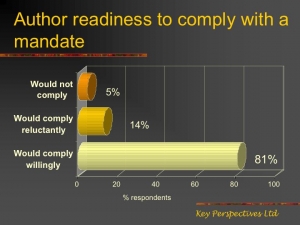 Phil Davis
Phil Davis continues his inexplicable preoccupation with what's best for the publishing industry, at the expense of what is best for research, researchers, their institutions, their funders, and the tax-paying public that funds them -- the ones by and for whom the research funded.
Phil's latest point is that the
low uptake by authors of
committed Gold OA funds indicates that authors don't really want OA.

But authors themselves have responded quite clearly, and repeatedly, in
Alma Swan's international surveys, that they do need, want, and value OA. Yet they also state that
they will only provide OA to their own writings if their institutions and funders require (i.e., mandate) them to provide it.
(There is definitely a paradox here, but it is not resolved by simply assuming that authors don't really want OA! It's rather more complicated than that. Authors would not
publish much, either, if their institutions and funders did not require them to "publish or perish." And without that, where would the publishing industry be?)
I have dubbed the condition "
Zeno's Paralysis," which is the fact that for a variety of reasons
(38 at last count) -- all groundless and easily defeasible but relentlessly recurrent nonetheless, including worries about copyright, worries about getting published, worries about peer review, and even worries about the time and effort it might require to provide OA -- most authors will not provide OA spontaneously. And the cure is not only known, but has already been administered by
over 150 institutions and funders:
Mandate OA.
And the only form of OA that institutions and funders can mandate is Green OA self-archiving of all peer-reviewed journal articles, immediately upon acceptance for publication.
Apart from that, all they can do is provide some of their scarce funds (largely tied up in paying for subscriptions) to pay for a little Gold OA publishing. The uptake for that is even lower than for unmandated Green OA self-archiving, but that's certainly not evidence against
Alma Swan's survey findings about what authors want, and what it will take to get them to provide it (and
Arthur Sale's data confirming that authors actually do as they say they will do, if mandated).
Ironically, the book Phil cites -- Stephen Jay Gould's "Mismeasure of Man" -- was also a critique, some of it well-taken, but likewise tainted by an ideological bias. In Gould's case the ideological bias was far, far more noble than Phil's parochial bias in favor of publishers' interests and the status quo: Gould was an idealistic marxist whose bias was against evidence indicating that there are genetic differences between human populations. In the core chapter of that book -- "The Real Error of Cyril Burt" -- Gould tried to show that psychometricians had made a methodological and conceptual error in interpreting the "G" factor -- a strong positive common factor that kept being observed among multiple, diverse psychometric tests across diverse populations -- as if it were an empirical finding, whereas (according to Gould) it was merely an inevitable result of their method of analysis: the "positive-definite manifold" that invariably results from the construction of a lot of positively correlated tests. (What Gould missed was that there was nothing about the analytic method that guaranteed that the joint correlations should all be positive, and certainly not that the resultant G factor should turn out, as it did, to be correlated with genetic differences between populations.)
The consensus in the field of psychometrics and biometrics today is that in this case the real error was Gould's.






